#Farmers Parliament
Photo

“Red Supporter Heard In House,” Kingston Whig-Standard. February 22, 1933. Page 1..
---
Spectator Tells William Irvine to "Give It to Them"
---
OTTAWA, Feb. 22— Orders were issued last night to House of Commons guards to eject from the public galleries all spectators who caused disturbance.s This action followed a minor commotion in the galleries during debate on a resolution to repeal the famous Section 98 of the Criminal Code, dealing with sedition and unlawful assemblies.
“Give it to them! That's the stuff,” exclaimed a young man in the north gallery, while William Irvine (U.F.A. Wetaskinwin) attacked Station 98 as archaic, drastic, and tempered to breed disrespect for law and order.
A guard rushed to the young man's chair, ordering him to leave speech-making to the members below. The man grabbed his coat and fled.
The House devoted an hour to consideration of the resolution of J. S. Woodsworth, leader of the Co-operative Commonwealth Federation, to repeal Section 98. Hon. Maurice Dupre, Solicitor-General, upheld the section as a bulwark against communism and radicalism, while William Irvine and Samuel Factor (Lib., Toronto West-Centre) characterised it as drastic and the type of legislation that fostered communism. Under one clause, said Mr. Factor, a man could be imprisoned twenty years for wearing a certain type button in his coat lapel,
Communist agitation was prevalent and was increasing all over Canada, declared Hon. Maurice Dupre. He charged that the move of the Liberal Government in 1926 to repeal Section 98 was prompted by Mr Woodsworth and that this was the price which the then Prime Minister was prepared to pay for the support of the Labor Group in the House of Commons.
#parliament of canada#house of commons#canadian politics#parliamentary debate#heckling#section 98#communism#anti-communism#suppression of dissidents#suppression of free speech#iron heel#co-operative commonwealth federation#united farmers#communist party of canada#democracy in canada#great depression in canada#political prisoners
2 notes
·
View notes
Text
Greens call for windfall profits tax on food to support farmers
Greens in the European Parliament have called on the Commission to take action on agriculture ahead of June’s EU elections, as a new survey confirms the growing power of eurosceptic parties in rural areas, Euractiv informs.
The Greens sent a letter to the European Commission on February 5 demanding action on EU agriculture. On the same day, a report by the Committee of the Regions (CoR) confirmed strong Eurosceptic voting trends in rural areas across the EU. The Greens have become the latest party to pledge to defend the interests of the agricultural sector amid farmer protests across Europe and approaching European Parliament elections.
Read more HERE

#world news#world politics#news#europe#european news#european union#eu news#eu politics#european parliament#european commission#green party#green politics#farmers#farmer#farmers protest#farmer protest
0 notes
Text
Just saw that vid of linder getting booed... I smiled
#have mixed feelings about the farmers but at least we have a common enemy 😭😭#his party doesnt even get 5% (if an election took place now) aka no parliament seats loooool#wait does foreign media even talk about our recent strikes?#sham!s rambles
0 notes
Text
The Great Green Rebellion: Farmers' Uprising Against the Quest for a 'Greener' Tomorrow
In a stunning turn of events that you might have missed (because let’s face it, it’s not on mainstream media, and who reads past the headlines these days?), farmers across Europe have decided they’ve had enough. No more Mr. Nice Farmer. From the picturesque fields of Germany to the romantic vineyards of France, the agricultural proletariat is rising against what they perceive as the tyrannical…
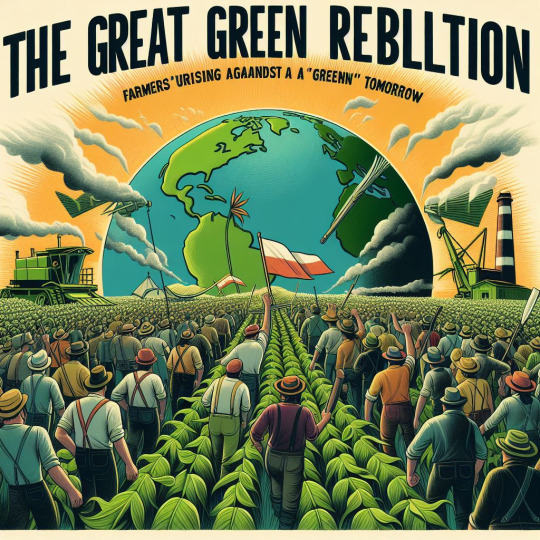
View On WordPress
#2024#Agricultural Policy#Agricultural Unrest#Agriculture Satire#Climate Change#Climate Policy#Dutch Farmers#Environmental Humor#Environmental Legislation#EU Parliament#European Farming#Farmers Protest#Farming Crisis#Farming Humor#France#Germany#Green Rebellion#irony#Manure Protest#Net Zero#Policy Satire#Political-Commentary#Rob Roos#Satire#Tractor Blockade#UN Agenda 2030
1 note
·
View note
Text
Indian Prime Minister Narendra Modi is, by some measures, the most popular leader in the world. Prior to the 2024 election, his Bharatiya Janata Party (BJP) held an outright majority in the Lok Sabha (India’s Parliament) — one that was widely projected to grow after the vote count. The party regularly boasted that it would win 400 Lok Sabha seats, easily enough to amend India’s constitution along the party's preferred Hindu nationalist lines.
But when the results were announced on Tuesday, the BJP held just 240 seats. They not only underperformed expectations, they actually lost their parliamentary majority. While Modi will remain prime minister, he will do so at the helm of a coalition government — meaning that he will depend on other parties to stay in office, making it harder to continue his ongoing assault on Indian democracy.
So what happened? Why did Indian voters deal a devastating blow to a prime minister who, by all measures, they mostly seem to like?
India is a massive country — the most populous in the world — and one of the most diverse, making its internal politics exceedingly complicated. A definitive assessment of the election would require granular data on voter breakdown across caste, class, linguistic, religious, age, and gender divides. At present, those numbers don’t exist in sufficient detail.
But after looking at the information that is available and speaking with several leading experts on Indian politics, there are at least three conclusions that I’m comfortable drawing.
First, voters punished Modi for putting his Hindu nationalist agenda ahead of fixing India’s unequal economy. Second, Indian voters had some real concerns about the decline of liberal democracy under BJP rule. Third, the opposition parties waged a smart campaign that took advantage of Modi’s vulnerabilities on the economy and democracy.
Understanding these factors isn’t just important for Indians. The country’s election has some universal lessons for how to beat a would-be authoritarian — ones that Americans especially might want to heed heading into its election in November.
-via Vox, June 7, 2024. Article continues below.
A new (and unequal) economy
Modi’s biggest and most surprising losses came in India’s two most populous states: Uttar Pradesh in the north and Maharashtra in the west. Both states had previously been BJP strongholds — places where the party’s core tactic of pitting the Hindu majority against the Muslim minority had seemingly cemented Hindu support for Modi and his allies.
One prominent Indian analyst, Yogendra Yadav, saw the cracks in advance. Swimming against the tide of Indian media, he correctly predicted that the BJP would fall short of a governing majority.
Traveling through the country, but especially rural Uttar Pradesh, he prophesied “the return of normal politics”: that Indian voters were no longer held spellbound by Modi’s charismatic nationalist appeals and were instead starting to worry about the way politics was affecting their lives.
Yadav’s conclusions derived in no small part from hearing voters’ concerns about the economy. The issue wasn’t GDP growth — India’s is the fastest-growing economy in the world — but rather the distribution of growth’s fruits. While some of Modi’s top allies struck it rich, many ordinary Indians suffered. Nearly half of all Indians between 20 and 24 are unemployed; Indian farmers have repeatedly protested Modi policies that they felt hurt their livelihoods.
“Everyone was talking about price rise, unemployment, the state of public services, the plight of farmers, [and] the struggles of labor,” Yadav wrote...
“We know for sure that Modi’s strongman image and brassy self-confidence were not as popular with voters as the BJP assumed,” says Sadanand Dhume, a senior fellow at the American Enterprise Institute who studies India.
The lesson here isn’t that the pocketbook concerns trump identity-based appeals everywhere; recent evidence in wealthier democracies suggests the opposite is true. Rather, it’s that even entrenched reputations of populist leaders are not unshakeable. When they make errors, even some time ago, it’s possible to get voters to remember these mistakes and prioritize them over whatever culture war the populist is peddling at the moment.
Liberalism strikes back
The Indian constitution is a liberal document: It guarantees equality of all citizens and enshrines measures designed to enshrine said equality into law. The signature goal of Modi’s time in power has been to rip this liberal edifice down and replace it with a Hindu nationalist model that pushes non-Hindus to the social margins. In pursuit of this agenda, the BJP has concentrated power in Modi’s hands and undermined key pillars of Indian democracy (like a free press and independent judiciary).
Prior to the election, there was a sense that Indian voters either didn’t much care about the assault on liberal democracy or mostly agreed with it. But the BJP’s surprising underperformance suggests otherwise.
The Hindu, a leading Indian newspaper, published an essential post-election data analysis breaking down what we know about the results. One of the more striking findings is that the opposition parties surged in parliamentary seats reserved for members of “scheduled castes” — the legal term for Dalits, the lowest caste grouping in the Hindu hierarchy.
Caste has long been an essential cleavage in Indian politics, with Dalits typically favoring the left-wing Congress party over the BJP (long seen as an upper-caste party). Under Modi, the BJP had seemingly tamped down on the salience of class by elevating all Hindus — including Dalits — over Muslims. Yet now it’s looking like Dalits were flocking back to Congress and its allies. Why?
According to experts, Dalit voters feared the consequences of a BJP landslide. If Modi’s party achieved its 400-seat target, they’d have more than enough votes to amend India’s constitution. Since the constitution contains several protections designed to promote Dalit equality — including a first-in-the-world affirmative action system — that seemed like a serious threat to the community. It seems, at least based on preliminary data, that they voted accordingly.
The Dalit vote is but one example of the ways in which Modi’s brazen willingness to assail Indian institutions likely alienated voters.
Uttar Pradesh (UP), India’s largest and most electorally important state, was the site of a major BJP anti-Muslim campaign. It unofficially kicked off its campaign in the UP city of Ayodhya earlier this year, during a ceremony celebrating one of Modi’s crowning achievements: the construction of a Hindu temple on the site of a former mosque that had been torn down by Hindu nationalists in 1992.
Yet not only did the BJP lose UP, it specifically lost the constituency — the city of Faizabad — in which the Ayodhya temple is located. It’s as direct an electoral rebuke to BJP ideology as one can imagine.
In Maharashtra, the second largest state, the BJP made a tactical alliance with a local politician, Ajit Pawar, facing serious corruption charges. Voters seemingly punished Modi’s party for turning a blind eye to Pawar’s offenses against the public trust. Across the country, Muslim voters turned out for the opposition to defend their rights against Modi’s attacks.
The global lesson here is clear: Even popular authoritarians can overreach.
By turning “400 seats” into a campaign slogan, an all-but-open signal that he intended to remake the Indian state in his illiberal image, Modi practically rang an alarm bell for constituencies worried about the consequences. So they turned out to stop him en masse.
The BJP’s electoral underperformance is, in no small part, the direct result of their leader’s zealotry going too far.
Return of the Gandhis?
Of course, Modi’s mistakes might not have mattered had his rivals failed to capitalize. The Indian opposition, however, was far more effective than most observers anticipated.
Perhaps most importantly, the many opposition parties coordinated with each other. Forming a united bloc called INDIA (Indian National Developmental Inclusive Alliance), they worked to make sure they weren’t stealing votes from each other in critical constituencies, positioning INDIA coalition candidates to win straight fights against BJP rivals.
The leading party in the opposition bloc — Congress — was also more put together than people thought. Its most prominent leader, Rahul Gandhi, was widely dismissed as a dilettante nepo baby: a pale imitation of his father Rajiv and grandmother Indira, both former Congress prime ministers. Now his critics are rethinking things.
“I owe Rahul Gandhi an apology because I seriously underestimated him,” says Manjari Miller, a senior fellow at the Council on Foreign Relations.
Miller singled out Gandhi’s yatras (marches) across India as a particularly canny tactic. These physically grueling voyages across the length and breadth of India showed that he wasn’t just a privileged son of Indian political royalty, but a politician willing to take risks and meet ordinary Indians where they were. During the yatras, he would meet directly with voters from marginalized groups and rail against Modi’s politics of hate.
“The persona he’s developed — as somebody kind, caring, inclusive, [and] resolute in the face of bullying — has really worked and captured the imagination of younger India,” says Suryanarayan. “If you’ve spent any time on Instagram Reels, [you’ll see] an entire generation now waking up to Rahul Gandhi’s very appealing videos.”
This, too, has a lesson for the rest of the world: Tactical innovation from the opposition matters even in an unfair electoral context.
There is no doubt that, in the past 10 years, the BJP stacked the political deck against its opponents. They consolidated control over large chunks of the national media, changed campaign finance law to favor themselves, suborned the famously independent Indian Electoral Commission, and even intimidated the Supreme Court into letting them get away with it.
The opposition, though, managed to find ways to compete even under unfair circumstances. Strategic coordination between them helped consolidate resources and ameliorate the BJP cash advantage. Direct voter outreach like the yatra helped circumvent BJP dominance in the national media.
To be clear, the opposition still did not win a majority. Modi will have a third term in office, likely thanks in large part to the ways he rigged the system in his favor.
Yet there is no doubt that the opposition deserves to celebrate. Modi’s power has been constrained and the myth of his invincibility wounded, perhaps mortally. Indian voters, like those in Brazil and Poland before them, have dealt a major blow to their homegrown authoritarian faction.
And that is something worth celebrating.
-via Vox, June 7, 2024.
#india#narendra modi#pm modi#modi#bjp#lok sabha elections#rahul gandhi#democracy#2024 elections#authoritarianism#anti authoritarian#good news#hope
721 notes
·
View notes
Text
Dabi x darling x Hawks
TW: NSFW, noncon, war, soldiers, married reader
AN: kinda inspired by when British Parliament passed the Quartering Act in 1765, and those in the American colonies were required to provide housing for British soldiers, and how they were also expected to provide food, firewood, and even beer.
fem reader

Thinking about old-timey soldiers Hawks and Dabi who knock on your door with their caps in hand, plastic smiles on both their faces when asking for a warm homecooked meal – knowing you can’t refuse by order of the King.
It’s a humble cottage more than it’s a house, but the two men make themselves at home while you slowly stir the stew you’ve whipped up for them – only halfway of your own free will.
Hawks asks where your husband is, and you point to the love letters displayed on the mantle and tell them he’d been called away seven months ago.
Dabi then asks if you’ve been lonely…
You try and laugh it off as though it was a charming thing of him to say – but you’ve been feeling apprehensive ever since you opened the door – seeing their hands casually resting on the weapons by their hip as though in silent threat.
You sit with your hands in your lap while they eat. They say they’ve missed the sweetness of a woman like you – that the lads back at base don’t know how to do it the same way. And you know they’re talking about the food, but still… you can’t help but feel they’re insinuating something else.
You scream when they grab you – but it’s not like they expected anything else from a married woman – of course, a good wife would give anyone who isn’t her husband some fight – but like any woman, you’re quickly subdued by the two of them.
Their smiles are still eerily calm, even as you cry – utterly unmatched by their actions, where they squeeze into all your plush parts with unwarranted strength.
Hawks hugs you from behind, forcing your arms behind your back – his crotch planted firm against your rear, even through all the thick layers of your skirt.
Dabi is in front of you. He ripped open your blouse in the struggle – now whistling at the pretty sight of your tits while stroking his revolver up the crane of your neck, poking it into your cheek before using it to brush a wisp of hair out of your face – pretty and riddled with tears while you snivel and whimper.
He takes your chin in a strong hand, his tone smooth while he tells you to calm down – as though he's not got his loaded fire weapon aimed at you. His nose brushes yours as he croons at you through a smile – giving your quivering lips a quick peck.
Hawks’ tone is just as suave – playful even, grinning toothily, chuckling out how they just want to thank you for the hospitality as he quickly tugs the wool of your dress up, balling it all around your waist. Petting your cunt through your bloomers with your wrists gripped firm in his other hand, pinned tightly to the small of your back.
Cutlery, plates, and cups crash to the floor when Dabi swipes to clear the table – sending you hips-first against it.
The nose of his gun jabs into your nape, forcing your head down until your cheek smudges the splintery wood.
He doesn’t bother retraining you, letting the threat of his bullets do to all the talking while he unbuckles his belt, letting his uniform drop around his ankles.
He rips a gash in the thin cotton of your bloomers. They look too cute to remove. Not frilly like rich maidens wear, like in those catalogs the men will pass around if not pictures of each other's girlfriends. Yours are worker class, probably sewn by yourself from some old curtains – not meant to be erotic, but made so erotic because of it.
You’re just a simple farmer’s daughter making your country proud – is what he whispers in your ear when he has two fingers stuffed up your cunt.
It’s obvious you haven’t been fucked in a while – the two digits make you wince and, in turn, make him restless to give you the real thing. He can tell just by the buck of your hips it’s going to feel the same as fucking a virgin.
You’re quickly wet like one, too. Makes it easy for him to slide into your tightness despite your teary whines.
He lets out a heavy groan when you’ve taken him to the hilt – stays nestled there for a minute – in reverence of the tight, wet warmth he hadn’t felt in a while.
Sure, he and Hawks might have done things on cold, long, lonely nights, but nothing can quite compete with the softness of a woman in his mind.
Those precious ways you tighten up and shake from the stretch, shuffling your thighs when he kneads into your womb – soaking him with wet velvet slick.
His gun goes lazy against your back, though still very much keeping you scared in place as he lolls in and out of you at a languid pace – his chin tipped up with a sigh.
But it’s only initial relief – and once it dies down and the hunger spurs anew – he’s got his lips at your ear and his gun in your mouth – crude things flying off his lips, hips thrusting against you with the same haste of a hound in his rut – saying if he were your husband, he’d never leave your cunt and cooking – that he’d pick being buried six inches deep between your thighs than six feet deep in the dirt – sucking your cheek while telling you not to fret long over your man – how he and Hawks will help you grieve when the love letters stop coming.
The blonde is busy looting the liquor cabinet while Dabi ravages your poor cunt – but he comes back to switch with him once he finds the most expensive bottle.
It was a wedding present you’d been saving, one you’d thought you’d open the day your love would return – but Hawks cares little for the etiquette and swigs it raw from the stem as he retakes his place behind you – bathing his thick shaft with the slick sheen on your inner thighs before pressing himself inside you.
He doesn’t bother to start slow – he’d been kept waiting long enough and goes straight to pounding you deep. Kicking your legs apart – a hand buried in the cake of your ass to steady you whilst the other grips the bottle.
The table is small. Meant for only you and your man – so perfect for bending you over – just intimate enough to allow Dabi to stand at the other end with his cock in your mouth.
The whole thing wobbles against the floor as the two men have their way.
They deserted from their battalion a long time ago and have both grown pretty tired of house-hopping – and this place seems far enough removed from where anyone would bother looking for them.
Who knows, maybe they’ll stay until the war is over.

♡ DABI - TODOROKI TOUYA masterlist
♡ HAWKS - TAKAMI KEIGO masterlist
♡ BOKU NO HERO ACADEMIA masterlist
#yandere boku no hero academia#yandere my hero academia#yandere bnha#yandere dabi#yandere dabi imagine#yandere dabi x reader#yandere touya#yandere todoroki#yandere touya todoroki#yandere touya x reader#dabi smut#dabi x reader#dabi todoroki#dabi my hero academia#dabi mha#touya todoroki#todoroki touya#mha dabi#bnha dabi#todoroki touya smut#touya smut#hawks smut#yandere keigo takami#yandere keigo#yandere keigo x reader#yandere takami keigo#yandere hawks#yandere mha#yandere#takami keigo
2K notes
·
View notes
Note
wait how bougie was Tom Riddle Sr.? How nice would his Manor have been? Was he like an actually Lord with a title and stuff?
thank you very much for the ask, anon!
in half-blood prince, dumbledore refers to tom riddle sr. as "the squire's son" - which allows us to state with certainty that he was a minor aristocrat.
however, the word minor is important here.
there are - historically - two levels of aristocracy in britain. the first are the peers of the realm - which refers to families which hold one or more of the titles of duke, marquess, earl, or viscount. these are the elite of the elite - these gradations of nobility were created in the middle ages as a way of distinguishing those who held the titles from other noblemen, usually because of a close relationship [often one of blood or marriage or both] to the king.
the titles are hereditary by male primogeniture, and the holders - while this is no longer the case - used to have political power [such as the right to sit in the house of lords], simply by virtue of their birth.
[this is why they're called "peers" - it refers to them historically being close in status to royalty, and therefore expected to serve as royal advisors.]
there is another class of peer - a baronet - whose title is similarly hereditary, but whose position doesn't come historically with the right to sit in the lords or advise the king by virtue of birth. [baronets may - of course - have been members of parliament, or royal advisors selected at the king's discretion, but this would be separate from their title. a duke, in contrast, could historically expect to request a meeting with the king simply because he was a duke.]
while some families have historically been ennobled at the king's discretion, access to any of these titles is pretty much restricted to the small group of families who've held them for centuries.
but below the peers of the realm, there is a second, more minor class of aristocracy, the landed gentry - of which a village squire is a textbook example.
historically, what is meant by "landed" is an ability to live off of the rental income of one's country holdings, which would be leased to tenant farmers. that is, they are landlords in the original sense of the term - lords of the land. this is what tom sr. tells us his family does in half-blood prince:
“It’s not ours,” said a young man’s voice. “Everything on the other side of the valley belongs to us, but that cottage belongs to an old tramp called Gaunt, and his children. The son’s quite mad, you should hear some of the stories they tell in the village - ”
what is also meant by "landed" is that the family in question is of the upper-classes, but that they are still "commoners" - which in this context doesn't imply a value judgement, but which is a socio-legal term which simply indicates that they don't hold an aristocratic title such as duke, earl etc.
[and gentry families certainly aren't common in terms of financial standing... the most famous member of this class in literature? fitzwilliam darcy, whose ten thousand a year is something like thirteen million quid in today's money...]
gentry families might be very old - they might have received their lands from the king in the middle ages as a reward for knightly service, and it's interesting to imagine generations of gaunts and riddles brought up alongside each other in little hangleton - or they might be comparatively newer - tom sr.'s great-grandfather [feasibly born c.1810] could have been a self-made victorian industrialist who bought the lands from the original holder and established himself as gentry.
by 1900, it was becoming much harder for the gentry to live on rental income alone, and many would also have had jobs. these would have been elite, and very frequently were in politics, the civil service, the military, or the law. tom sr's father - whom the films call thomas, so let's go with that - might, for example, have served as a high-ranking officer in the army [including during the first world war], be the local magistrate, or be the local member of parliament.
in terms of titles, thomas riddle would almost undoubtedly be sir thomas - and this is how it would be correct to address him. but this title would be a courtesy, and it wouldn't be hereditary unless the riddles were also baronets [which it's entirely plausible that they were].
which is to say, tom sr. would not have a title while his father was alive - although he would have the right to be referred to formally in writing as mr thomas riddle esq. [esquire]. the correct form of verbal address for anyone other than friends and family would be to call him mr riddle, although the riddles' servants would probably refer to him as mister tom.
tom jr. would not have a title while his father or grandfather was alive. if the riddles were baronets, he would technically inherit the title after he kills the rest of the male line... but given that tom sr. never acknowledged him and his existence was presumably unknown to the riddles' lawyers this wouldn't be something which happened in reality. the estate's executors clearly took control of the riddles' property, the land was portioned off and sold, and the house became a standalone property for sale.
the riddle house - which is a name used informally for it in little hangleton, it would have a different "proper" name - is described in canon in ways which show that it's a typical manor house, which means it would look something like this:


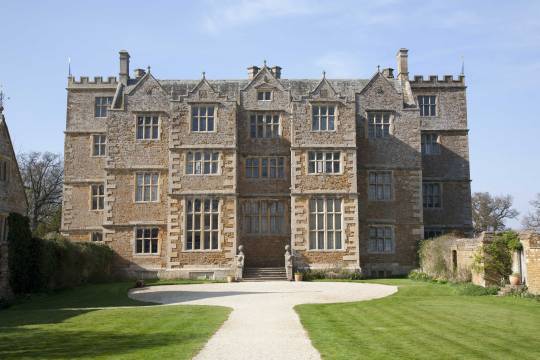


these houses are obviously very impressive, but they're tiny in size in comparison to the magnificent stately homes - places like blenheim palace, chatsworth, burghley house, holkham hall - lived in by the titled aristocracy. the riddles would entertain - for example - by giving house parties, dinner parties, hunting parties, etc., but they wouldn't have a ballroom or a dining hall capable of seating hundreds.
[they would probably also own a property - probably a flat or small house - in london.]
they would have servants, but not colossal numbers - they would undoubtedly have a butler but not footmen, and the upstairs maids would report to the butler since they probably wouldn't have a housekeeper. they canonically have a cook, who probably had one or two kitchen maids assisting, and they canonically have a gardener - frank bryce - who probably doesn't have any assistants. they may, depending on the size of the estate, have a gamekeeper. sir thomas undoubtedly had a secretary and a chauffeur, and his wife might have a lady's maid. tom sr. would have had a nanny and then been educated until at least the age of eight by a governess, but would then have attended a prep school [either day or boarding] until the age of thirteen, and then gone to a boarding school, from which he likely went on [on the basis of social class rather than talent] to oxford or cambridge.
the family would have enormous social influence locally. most people - and also businesses - in little hangleton would be their tenants, and they would also probably have a say over the appointment of the local clergyman [an important figure in the community in the nineteenth and early twentieth centuries], since the parish church is likely to have been something called a "living" - the thing which turns up again and again in jane austen - which means that the church and its parsonage technically belongs to the landowner, but is granted to the vicar as a freehold while he's in post.
gossip about the riddles' doings would also be the main source of local interest - the servants were dining out for months on tom sr.'s elopement and return.
so they're something resembling celebrities - but they're local celebrities. nobody in london - and even nobody in cities we can imagine are nearer to little hangleton, such as liverpool - would particularly know or care who they were. tom sr. might have made it into the london gossip columns if he was part of a particularly scandalous "set" [a group of friends] who socialised in the capital, but these mentions would have been fleeting - and the press would have been much more concerned by the doings of members of his set who were genuinely titled or who were legitimately famous.
[this is the reason why mrs cole doesn't recognise the name. if merope had said her son was to be named cecil beaton after his father, she may well have been prompted to hunt him down...]
so tom sr. is elite - but he's elite in a way which is extremely culturally-specific, and which is [just like the portrayal of aristocracy in the wizarding world - the blacks, for example, are far less aristocratic than the riddles in terms of canonical vibe] often exaggerated into the sort of pseudo-royal grand aristocracy which the british period-drama-industrial-complex makes such a big deal of.
and tom jr.'s character is affected by this in a series of extremely interesting ways.
by which i mean that, in terms of blood, he's probably the most aristocratic character in the series - the absence of grand aristocracy in the wizarding world would mean that [were he raised by his father] he would come from a social background which was equivalent [even as it was divided from them by virtue of being muggle] to any of his fellow slytherins, and would help him easily blend into their society because the manners, genre of socio-cultural reference points [he would recognise, for example, that quidditch heavily resembles both rugby and polo], accent and way of speaking etc. that he would possess would be broadly indistinguishable from those of his pureblood peers.
[this is why justin finch-fletchley and draco malfoy speak in essentially the same way.]
but he would then be given the enormous boost in cachet - one which would genuinely elevate him above the rest of his cohort - of his maternal line.
and we see in canon that this does bestow some privilege on him among his peers while he's in school:
Tom Riddle merely smiled as the others laughed again. Harry noticed that he was by no means the eldest of the group of boys, but that they all seemed to look to him as their leader.
“I don’t know that politics would suit me, sir,” he said when the laughter had died away. “I don’t have the right kind of background, for one thing.”
A couple of the boys around him smirked at each other. Harry was sure they were enjoying a private joke, undoubtedly about what they knew, or suspected, regarding their gang leader’s famous ancestor.
where he's let down socially is that people like slughorn - to whom he can't reveal his slytherin ancestry and hope to maintain cover for his wrongdoing - don't think he's come from anywhere particularly special. this is because he has a muggle father - absolutely - but it's even more that he has a muggle father who, since he left him to be raised in an orphanage, was presumably working-class.
what the young voldemort lacks is any socio-cultural familiarity with the muggle class performance which the class performance of the wizarding world parallels. abraxas malfoy boasting about how important his father is would be something a tom jr. raised by the riddles could match - "oh yes, my father gives to all sorts of causes too. in fact, he was invited to buckingham palace because of it." - establishing himself as an equal in terms of class and social influence even if he isn't an equal in blood.
what actually happens in canon is that the orphaned tom - with his uncouth manners and his working-class accent - has no hope of gaining any sort of social equality with his posh peers.
so he becomes determined to outrank - and humiliate and control - them.
#asks answered#asenora meta#tom riddle sr#tom riddle#lord voldemort#surprise! it's the class system!
232 notes
·
View notes
Text
what if viserys legalized gay marriage then died and then alicent and rhaenyra got married and rhaenyra sat the iron throne and she executed daemon and made alicent her hand and they ruled side by side for sixty years and they formed a standing army and gave farmers land rights and created a parliament and then after rhaenyra died alicent guided westeros toward its first ever presidential election and it became a republic and elected a member of house tully and then alicent died and she was buried at the site of the pyre where rhaenyra was burned and dorne was never conquered and the dornish discovered germ theory and a merchant from oldtown invents the printing press and a maester working in winterfell invents steam engines
84 notes
·
View notes
Text
AUUC('s Edmonton Branch) released a statement on the Volunteer Nazi given a standing ovation in Canadian Parliament, read it

[x]
transcription after the cut
The Edmonton Branch of the Association of United Ukrainian Canadians (AUUC) condemns the honoring of a nazi Ukrainian World War II veteran, a member of the notorious 14th Waffen SS Division "Halychyna", in the House of Commons during the visit of Ukrainian President Zelenskiy last Friday, 22 September, 2023.
Our Association, founded in 1918 in Winnipeg as the Ukrainian Labor Temple Association, has an unblemished record of opposing fascism, in word and deed, before and after WWII, in Canada, in the Ukrainian-Canadian community, and abroad. Our members fought heroically in the Spanish Civil War, on the side of the Republican government, against fascism. They fought for Canada, allied with the Soviet Union, against nazi Germany and fascist Italy in WWII.
It is therefore unbelievable to us, as to most other Canadians, that when the individual in question, Yaroslav Hunka, was introduced in parliament as a Ukrainian veteran of WWII who fought against Russia, no one in attendance, all of whom gave him two standing ovations, realized what this meant. We know exactly what it meant.
Now this shameful spectacle has been publicized to all Canadians, and throughout the world. We welcome this publicization. We hope it will lead to a reckoning. Some steps in this direction have already been taken. The speaker of the House of Commons has resigned. An endowment in the name of Yaroslav Hunka at the Canadian Institute of Ukrainian Studies, at the University of Alberta, has been returned. We welcome these steps. But they are only first steps. Much more must be done. The problem is greater than simply one nazi, one speaker, and one endowment.
It is estimated that two thousand members of the 14th Waffen SS Division "Halychyna" were allowed into Canada after WWII. Our Association, immediately at that time, publicized and opposed their entry, to our everlasting credit. This figure does not include other nazis and nazi-collaborators, of various nationalities. That means thousands of Yaroslav Hunkas. Several of them went on to occupy prominent and leading positions in certain other Ukrainian-Canadian organizations, in religious institutions, educational institutions, and state institutions. The Canadian state supports, with funding and semi-official recognition, Ukrainian-Canadian organizations that unapologetically honor these nazis. If honoring Yaroslav Hunka in the House of Commons was a shameful act that had to be corrected, then so must all these other cases be corrected.
We therefore call on the Canadian state at all three levels (federal, provincial, municipal) to halt all state funding to all Ukrainian-Canadian organizations which honor any Ukrainian nazis or nazi-collaborators, including especially veterans of the 14th Waffen SS Division "Halychyna", until such time as these organizations explicitly and unequivocally apologize for having done so, severing all connections with all these nazis and nazi-collaborators, in all forms whatsoever.
We call for the removal and dismantling of two monuments to nazi Ukrainians in Edmonton: the monument to the veterans of the 14th Waffen SS Division "Halychyna" located in St. Michael's Cemetery, and the bust of Roman Shukhevych located at the Ukrainian Youth Unity Complex, preferably by their respective property owners, and if not by them, then by state compulsion.
We call on the government of Canada, and on the Liberal Party of Canada which formed the government at the time, to issue official apologies to our Association (the AUUC), in consultation with our Association, for banning it (then named the Ukrainian Labor-Farmer Temple Association) by an order in council in June 1940, seizing its properties, our halls and their contents (furniture, musical instruments, dance costumes, books, etc., most of which were destroyed), and interning our leaders in internment camps, acknowledging this as a terrible miscarriage of justice and act of oppression.
We call on all Canadians, all progressive Canadians, all decent Canadians, all anti-fascist Canadians, individually and through their various organizations, to support us in these calls for justice, by publicizing this statement, and pressuring their political representatives.
310 notes
·
View notes
Photo
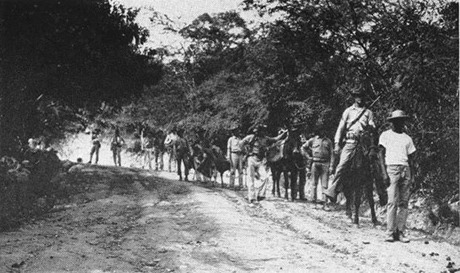
On this day, 28 July 1915, the United States invaded Haiti, crushing opposition and setting up a dictatorship which governed the country for the next 19 years. US Secretary of State Robert Lansing claimed the invasion was necessary to end "anarchy, savagery and oppression" in Haiti, and claimed that "the African race are devoid of any capacity for political organisation." The government had been lobbied for some time by US banking interests to occupy Haiti to assert US financial dominance as opposed to dominance by the financial institutions of the French former colonial power. In the years of occupation, the US forcibly dissolved parliament, killed thousands of people – and posed for photographs with their corpses – as well as siphoning wealth from the country. They also tied people up with ropes and forced them to work for no pay, killing people who attempted to flee. US authorities installed a puppet leader, Louis Borno, who admired fascist dictator Benito Mussolini, and had him take out a loan from the National City Bank, the forerunner of Citigroup. Around a quarter of Haiti's revenues then went towards paying for this loan. The measures left Haitian farmers "close to starvation level", according to the United Nations. While formal US colonial occupation ended in 1934, US retained neocolonial financial control of the country through the remaining debt until 1947. Reflecting on his role in the events, US Major General Smedley Butler stated that he "helped make Haiti and Cuba a decent place for the National City Bank boys to collect revenues," and described himself as a "racketeer for capitalism." More information, sources and map: https://stories.workingclasshistory.com/article/10016/us-invasion-of-haiti https://www.facebook.com/photo.php?fbid=668997001940185&set=a.602588028581083&type=3
557 notes
·
View notes
Text
Daily update post:
Yesterday, the IDF managed to prevent an independent Palestinian terrorist attack, by killing the would be terrorist on his way to execute his plan. Based on the type of weapons that were found on him, had he managed to carry out the attack, there probably would have been a lot of fatalities.

Also yesterday, the UN Security Council had an emergency session to discuss the UN report on the sexual violence of Hamas on Oct 7 and since (with the hostages). This was thanks to Israel asking several countries to request this session, and the US, the UK and France obliged. Believe it or not, more than 5 months after the biggest massacre of Jews since the Holocaust and the single bloodiest day in the Israeli-Arab conflict, that was the FIRST time that the UN has met to discuss what happened to people in Israel on that day. Let it sink in that the UN has discussed earlier and more frequently the situation in Gaza, than the massacre that started it. And that the UN still doesn't consider Hamas a terrorist organization. Israel again asked for this to change during yesterday's session.

Remember how I wrote about Yussuf and Hamza al-Ziadna, 2 of the 3 Muslim Israeli hostages, still held in Gaza after more than 5 months? Well, yesterday at the UN, Ali al-Ziadna, Yussuf's brother and Hamza's uncle, confronted the Palestinian ambassador, demanding to know why the Muslim Israeli hostages have not been released to fast and pray during Ramadan, as all Muslims should get to, and how could Hamas call themselves Muslims... (I'll just correct one thing he said: while Hamas released 23 of its 32 Thai hostages without asking for anything in return, but as part of the November 2023 deal to release the Israeli hostages, 9 Thai citizens are still in captivity. I do not want anyone to forget these men, they must be released and reunited with their loved ones, too)
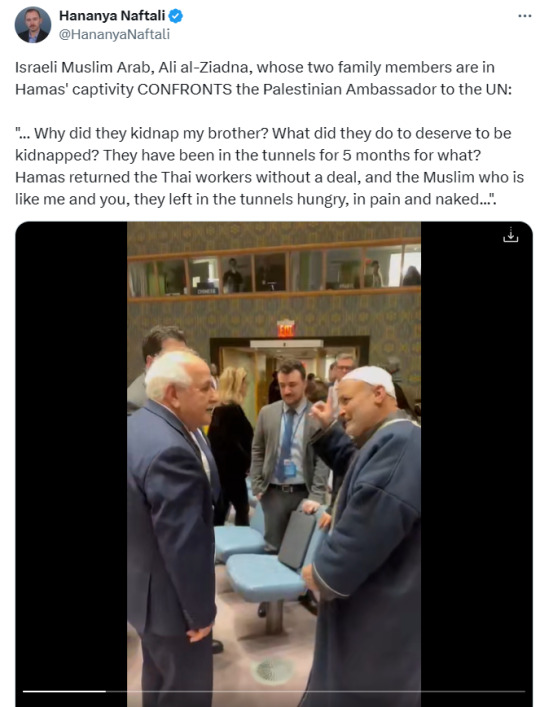
The BBC has already been accused by members of the British Parliament of being institutionally antisemitic. Now, it seems like the British broadcaster is insisting on further proving those accusations right, as its head chooses to defend the BBC's use of an unsubstantiated witness account from a "journalist" known to be working for Iran, and who has in the past praised terrorists killing Israelis (his testament matches Hamas' narrative) regarding the stampede incident in northern Gaza. But, you know. Good on the Jews and the Jewish state for controlling the media. *eyeroll*

This is 58 years old Rami Davidian.

He's a farmer from moshav Patish. On Oct 7, he got a message from a friend, asking Rami to save his kid, who was at the Nova music festival, where today we know was the single deadliest scene of all the place Hamas attacked during the massacre. Rami went in, and saved the kid and 12 others in his vehicle, while also directing others to moshav Patish. This led to more people hearing about it, and calling Rami as well, giving him details about their loved ones, and asking for his help in rescuing them. Rami went back in, again and again, to an active shooting scene controlled by murderous terrorists, for hours, and he kept getting people out. Once, to save the life of a young girl, he approached the terrorists, and speaking Arabic to them, he lied that he's a Muslim Arab like them who came to warn them of nearing soldiers, and that they must flee, leaving their victim behind. Rami didn't know this, but on that day, many actual Israeli Muslim Arabs were murdered by Hamas for "working for the Jews," which the terrorists claimed made these Arabs even worse than the Jews. But miraculously, the lie worked for Rami. Once the IDF arrived and Rami was no longer needed to save the living, he helped with the identification and bringing to burial of the dead. After everything he had done for others on that day, risking his own life repeatedly, 2 days ago Rami gave an interview, and said that it's the survivors of Hamas' sexual violence who are the real heroes. Thank you for everything you did and who you are, Rami. Together with other people who risked themselves to save others, whether Jewish or not, you are gibor Yisrael (hero of Israel).
This is 19 years old Itay Chen.

He's one of the Israeli hostages that in the past 5 months, I have heard his parents speaking about their fears over not having gotten a sign of life, and hopes for his release countless times. As Itay has an American citizenship, they even personally met with Biden to plea for their son's life. Today we got the announcement that he had in fact been murdered on Oct 7, and it's his body that's being held captive by Hamas. I have no doubt that Israel will still do whatever it can to get it back, and allow him to be brought to kever Yisrael (Hebrew term for Jewish burial. Literally: Israel grave), and it would even release convicted terrorists to make that happen (it has done this before), but obviously the "price" for a living hostage is higher, not to mention that the thought of someone alive and suffering in captivity comes with a greater psychological pressure and urgency, so Hamas intentionally and cruelly let his parents spend months not knowing, hoping for what Hamas already know was impossible, fly all over the world, and beg for something that no one could give them. I just have no words for this type of ruthlessness.
May his memory be a blessing.
(for all of my updates and ask replies regarding Israel, click here)
#israel#antisemitism#israeli#israel news#israel under attack#israel under fire#terrorism#anti terrorism#hamas#antisemitic#antisemites#jews#jew#judaism#jumblr#frumblr#jewish#israelunderattack#un
107 notes
·
View notes
Text

"AT THE FUNERAL OF DR. BEATTIE NESBITT," Toronto Star. February 4, 1913. Page 4.
---
Crowds Around the Late Dr. Nesbitt's residence.
The Grave in Old St. James' Completely Covered With Flowers.
Floral Tributes From Daughter, Wife, and Brother.
#toronto#funeral services#ontario politics#member of parliament#farmers' bank#capitalism in canada#conservative party of ontario
0 notes
Text
Discontented farmers surround European Parliament
About 1,000 tractors made their way to Brussels, and police were forced to use water cannons as farmers pelted eggs and set off fireworks around the European Parliament.
Belgian police reported that farmers blocked roads leading to the European Union summit in Brussels on Thursday using about 1,000 tractors. Angry farmers complain over taxes, rising prices, cheap imports, regulations and bureaucracy. Hoping their protests would finally be heard at the summit, they travelled to Brussels.
Public order police guarded the barriers where EU leaders meet, just a few blocks from the European Parliament building, surrounded by tractors.
Read more HERE

#world news#world politics#news#europe#european news#european union#eu politics#eu news#european parliament#brussels#farmer#farmers#farmer protest#farmers protest
0 notes
Text
Warhammer Gaslamp: Introduction
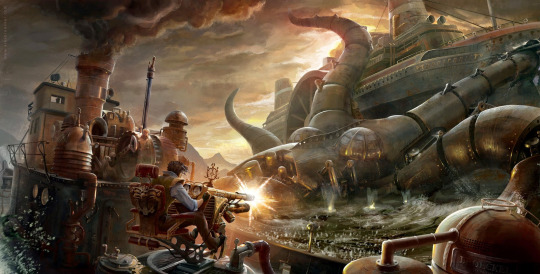
The year is 2725 IC...some two hundred years since the Age of Crisis. The time of Karl Franz I, the "Fourth Deliverer of the Empire," has long past, as has the age of knights and dragons – throughout the Old World, magic itself is a dying art.
The Empire of Man is stronger than ever before, but it is an Empire that runs on coal and iron, held together with roads of steel track, and powered by boiling, thumping hearts that pump steam and gas through the veins of the mightiest industrial power in the world. The forests remain, but they have dwindled in size, cut down to feed the endless hunger of the great metropolises, the mighty smokestacks of Nuln, Talabheim, New Averheim, and greatest of all, the bright gaslights of mighty Altdorf ("The Big Turnip"), and a hundred smaller cities that light the night skies.
The Neüscience of the Imperial Technomancers has increased national prosperity a hundredfold, improved the health and well-being of the common citizens, and helped the Imperial Army, Navy, and Airkorps put the endless hordes of Khaos on the backfoot for generations. In spite of (or because of?) this, Imperial society has become increasingly divided between the elite who profit from the new economy of high finance and heavy industry, and those millions of unskilled and semi-skilled laborers whose endless toil keeps them only ever one step ahead of the breadline and the bailiff. Meanwhile, the mounting toll of industrial pollution, epidemic disease, industrial accidents, and Neüscientific “experiments” running amok raises new questions about the high cost of success.
Politics has become ever more fractious. The Imperial Parliament is divided between the House of the People, where the Farmer-Artisan Party (representing a coalition of the Craft Guilds and their fellow urban workers, and a significant minority of rural laborers and small farmers) holds the plurality, and the House of the Nobles, where the Liberal-Conservative Party (representing both the traditional landed aristocracy and the new monied elite) holds power, and the two clash fiercely over labor rights, taxation, industrial regulation, and social welfare. Holding the uneasy balance of power is Emperor Karl-Franz XIV, his "Iron" Chancellor Ludwig von Ostermark, and their smaller Patriotic Party (largely supported by veterans and members of the civil service), who try to maintain Imperial unity and industrial production in the face of the "Threat from the Black North."
In the streets and on the shop-floors, the captains of industry known as the Great Monopolhauses (allied and often intermarried with the nobility) deploy their legions of spies and private soldiers against the rising strength of the Laborer’s Guild, who are mobilizing in the factories by the hundreds of thousands, and the industrial spies and gunthugs are kept in check only by the still-potent might of the Craft Guilds who fear and resent their industrial upstart rivals but trust the bosses even less.
The religion that once united an Empire today divides it, as Orthodox Volkmarites and Radical Hussites split over matters of class and faith. Although the two factions are still nominally part of the same Sigmarite religion, and the Church of Sigmar is held together by the firm hand of the Emperor, the two factions compete fiercely over theology and dogma, and positions within the Church unto the Grand Theogonacy itself. To the north, the philosophy professor-turned-street preacher Nietzsche von Zarathustein has single-handedly revived the fortunes of the Cult of Ulric with his fiery doctrine of Neo-Ulricism and his best-seller Man unt Wulf-Man. From the great industrial heartland of the south, the radical scholar Mark Karhl preaches the overthrow of the status quo as an inherently exploitative regime, and his pamphlet The Scarlet Platform and his massive three-volume treatise on political economy, Der Gelden (which almost no one has completed), inspire many young radical students and workers to join the revolutionary Scarlet Party and the ranks of the Laborer’s Guild. Are rumors of his secret allegiance to a Tzeenchite secret society true, or mere bourgeois propaganda?
Exacerbating these divisions is the constant threat from Khaos. Up in the "Black North" and their allied territories on the great steppes on the other side of the pole, the forces of evil pervert the laws of science to their mad push for world domination. Khornate breeder-lords select from an unceasing flow of gladiators to produce the perfect warriors; Nurglite bio-priests carefully engineer the next insidious plague to slip past the Imperial Plasmic Survey; Slaaneshi sin-merchants mobilize a world-wide network of Cathayan black tar and warpdust powder (bartered from the Skaven) to corrupt the Empire from within; and Tzeenchite techno-mancers design ever more fiendish mutated F.R.E.A.K.S and the twisted Biomechs.
Inside the Empire, things are scarcely better. Even with the darkness of the forests pushed back to the periphery and the Greenskin hordes banished to the far side of the World's Edge Mountains, the threat of Were-beastmanism and other, more insidious, forces winds its way into every neighborhood in the Empire despite the best efforts of the Imperial Plasmic Survey and the Schwarzmänner. Mutants who cannot conceal their true nature – known as the "Untervolk" - have decamped into the subway tunnels and sewers that form the Undercities of the Empire, waging an unceasing war for survival against “norms” and “ratfolk” alike. From the back alleyways and the salons of the nobility alike, the endless secret societies of Khaos vie to do their masters' bidding, undermining the Empire from within in preparation for the coming war.
It is a time that desperately needs heroes, men and women willing to brave the darkness on the mean streets and the shell-torn battlefields of the Old World alike. Mystery and intrigue, adventure and mad science await!
55 notes
·
View notes
Note
Am I the asshole for wanting to be a sugarcane farmer?
I was a born in London, a loyal subject of the king. I was a soldier for my country, was voted into parliament, had a burgeoning career. I was asked to run a township. I, of course, accepted. And then the king assigned me here.
Really, here? Seven thousand miles from England, in the middle of the jungle with the bugs? The food is barely edible, in this colony so far away it takes a month to get a message home!
But it's three thousand acres of land so fertile you could grow almost anything off it. I figured I'd skim each harvest, and soon enough be so rich I'd leave Guiana in the dust and buy a house in Chelsea.
But noooo. No, no, I'm still here. And now these engineers are building flywheels and some ridiculous brick sphere on the waterfront, the best place I can grow my contraband, sugarcane. Ah, glorius sugarcane. A letter comes from London telling me to give them what they need. Now I'm stuck with nothing. No, your Majesty, that's not what we agreed upon!
Then in comes this celebrity and everyone adores him. Even the monarchy. He speaks a lot of nonsense—some rot about the stars, while his soft hair shines in the low light and his eyes glitter like the constellations he loves so much. Personally, I don't find it worthy of my time to listen to him. Besides, it's infuriatingly distracting the way his lips purse when he maps out the stars. And—do you know the worst part? Then he has the nerve to invite an American! Woman! to run the project. Can you believe that?
Well, I of course tried to put a stop to that. At first I tried my hand at subtlety, poisoning the clay that made their bricks with lime. I'd hoped they might leave my township if their flywheels splintered, but no luck there. Yet another American woman noticed that one. There seem to be an awful lot of them, these days. And that celebrity, well. He kept looking at them. Like he's their friend. Hmph. He never looked at me like that.
But then I realised: this was an opportunity! If there was an accident, it wouldn't reach the throne for thirty days! I'd remove the evidence, using my quick wit and myriad employees, and I'd send a report home. Something tearful, painting me as a bystander who, tragically, was the only survivor of the dreadful accident that occurred. Murder wouldn't even cross their minds!
I've done my time! I've been the upstanding subject of his Majesty, and now? Now this "sphere" of theirs will crash to the ground, into the dust where it belongs. Here? I'll be the last man standing!
And the sugarcane will finally be mine. Rows and rows of it, and soon I'll be living like a king! Well, I'm not just doing this for sugarcane. I'm also doing it... because I don't like them.
So, AITA?
45 notes
·
View notes
Text
72,9% citizens of poland went to the polls yesterday to "choose" new government and AFTER 8 YEARS OF RIGHT WINGED CATHOLIC POPULISTIC REGIME WITH STALINIST-NORTH KOREAN METHODS THE FUCKERS ARE UNABLE TO RE/CREATE A NEW GOVERNMENT AND THE "DEMOCRATIC" OPPOSITION COALITION WILL DO IT
votes are still being counted but it looks like this now:
• right winged populist catholics old sad wrinkled man energy we hate russia but we do absolutely the same to our people also we hate the west, the east, the south & the north party - 39,62 %
• liberals democrats capitalists EU fanboys party - 26,74 %
• we are catholics but most of us are not chauvinists also we are cool because our main man is famous because he was a host in the tv talent show + some of us are also a farmers party - 14,15%
• polite left party – 8,09 %
• pedocapitalisticfascists polexitflatearthers we love climate change and pollution party aka kids club - 7,38%
---the following two will not get into the parliament:----
• the individuals - 1,9 %
• what the fuck is that? - 1,69 %
84 notes
·
View notes